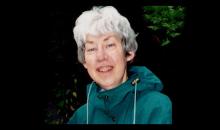The Department of Asian Languages and Literature regrets to announce the passing away of our colleague Affiliate Associate Professor Judith M. Boltz, Ph.D. Dr. Boltz died in Seattle on March 25, 2013. The members of the Department extend their deepest sympathies to her husband of forty-two years, Professor William G. Boltz. Funeral arrangements will be private.
A Tribute to Judith Magee Boltz - April 8. 2013
by Paul R. Katz, Academia Sinica, Taiwan
The field of Daoist Studies mourns the loss of Judith Magee Boltz (Judy), who passed away in her home on Monday afternoon, 25 March 2013. She was an Affiliate Associate Professor and a member of the Graduate Faculty in the Department of Asian Languages & Literature, University of Washington, Seattle campus.
In the course of her distinguished scholarly career spanning over three decades, Judy gained the profound respect of her peers due to her dedication to the pursuit of academic excellence, her methodological rigor and attention to detail, and the pains she took to express herself in crystal clear English. This devotion to rigor and clarity was already apparent in her earliest scholarly work, her Ph.D. thesis entitled “Taoist Rites of Exorcism”, completed at UC Berkeley in 1985 under the tutelage of Michel Strickmann (1942-1994) and Edward H. Schafer (1913-1991). This pioneering study examined the diagnosis and treatment of mental disorders attributed to spirit possession in China during the 12th-14th centuries, based on the close yet sensitive reading of Daoist ritual manuals and other narrative sources. It also focused our attention on the judicial nature of exorcistic rituals as seen in “rites of evocation by interrogation” (kaozhao fa 考召法).
Just two years later, Judy published A Survey of Taoist Literature, Tenth to Seventeenth Centuries (1987; re-issued with corrigenda in 1995), which drew on yet far surpassed her dissertation in terms of its scope and its depth. A magisterial study of late imperial Daoism, this book expertly summarized and enhanced our knowledge of a plethora of topics ranging from ritual to hagiography to sacred geography. It remains one of the first works scholars in Daoist Studies pull off their shelves when grappling with complex textual and historical issues.
Judy’s achievements also include a number of highly stimulating articles, including “Opening the Gates of Purgatory” (1983; an innovative analysis of the structure of Daoist mortuary rituals), “In Homage to T’ien-fei” (1986; a study of one Daoist scripture about the renowned goddess Tianfei 天妃/Mazu 媽祖), “Singing to the Spirits of the Dead” (1996; a monumental exploration of Daoist mortuary rituals, especially for people who suffer tragic deaths), and “On the Legacy of Zigu and a Manual on Spirit-Writing in her Name” (an examination of the cult of the Purple Maiden (Zigu 紫姑; originally the Maiden of the Privy or Cegu 廁姑) and its role in the development of Chinese spirit-writing rituals). Perhaps her most influential and thought- provoking effort was the article “Not by the Seal of Office Alone”, published in 1993 in the edited volume Religion and Society in T’ang and Sung China, which opened our eyes to a number of previously under-appreciated phenomena, including the interaction between Han and non-Han ritual traditions, the tendency of some officials to study Daoist rites in order to effectively assert their authority over local cults, the possible uses of gunpowder in Daoist exorcistic rituals, etc. Although she would never have openly acknowledged any sense of pride in these impressive accomplishments, it is clear that she took great care and found true personal satisfaction in all her work, due in large part to her passion for scholarly research.
Apart from her own academic endeavors, Judy gave unstintingly of herself in performing service of the field. Examples may be found in the 42 entries she composed for the Encyclopedia of Taoism, as well as four entries she contributed towards the completion of Monica Esposito (1962-2011)’s on-going Daozang jiyao 道藏輯要 project. She also wrote a number of book reviews, as well as two memorial essays for Piet van der Loon (1920-2002).
Taken as a whole, Judy’s research has made a substantial impact on all who experienced it. One scholar told me of reading a copy of her unpublished “Cartography in the Daoist Canon”, which he described as simultaneously humbling and inspiring due to its tremendous erudition. Another referred to her as a “fantastic scholar” whose writings were a model for us all. Everyone expressed deep sorrow at this loss for our field.
For my part, I will always remember spending time with Judy at a Daoism conference held at Mount Tiantai (天台山) in May 2005. Judy presented a paper on Daoist ritual counterparts to xing’gan xi 醒感戲 (also written as xing’gan xi 省感戲, which she translated as “dramas on the sense of an awakening”), namely ritual operas performed in Zhejiang 浙江 (especially Yongkang 永康) with Buddhist and Daoist themes intended to both memorialize the dead and also inspire their audiences to pursue the good. This paper, which may date back to her 1987-1988 postdoctoral fellowship at the Chinese Popular Culture Project at UC Berkeley, greatly impressed a number of leading Chinese scholars attending the conference, especially those who had tended to view their Western counterparts as masters of theory but not philology. Judy was also a warm, friendly and easy-going presence, a true joy to be with.
Judy is survived by her husband William G. Boltz (Bill). They were married for 42 years, and enjoyed the type of relationship so treasured among academics and scholars, sharing their love of learning in ways that enriched both of their lives. Despite our grief at Judy’s passing, let us cherish our memories of her, while also striving to emulate her example for subsequent generations of scholars to follow.
